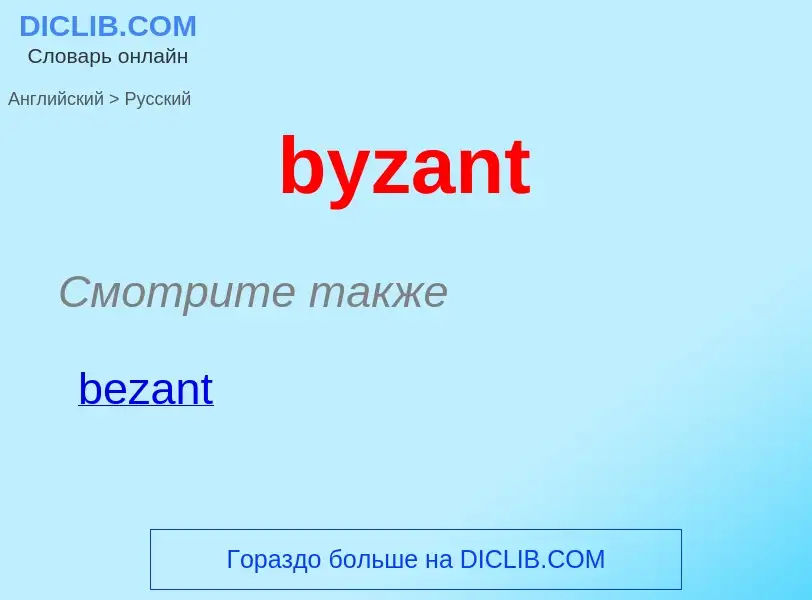ترجمة وتحليل الكلمات بواسطة الذكاء الاصطناعي
في هذه الصفحة يمكنك الحصول على تحليل مفصل لكلمة أو عبارة باستخدام أفضل تقنيات الذكاء الاصطناعي المتوفرة اليوم:
- كيف يتم استخدام الكلمة في اللغة
- تردد الكلمة
- ما إذا كانت الكلمة تستخدم في كثير من الأحيان في اللغة المنطوقة أو المكتوبة
- خيارات الترجمة إلى الروسية أو الإسبانية، على التوالي
- أمثلة على استخدام الكلمة (عدة عبارات مع الترجمة)
- أصل الكلمة
byzant - ترجمة إلى الروسية
ويكيبيديا

In the Middle Ages, the term bezant (Old French besant, from Latin bizantius aureus) was used in Western Europe to describe several gold coins of the east, all derived ultimately from the Roman solidus. The word itself comes from the Greek Byzantion, the ancient name of Constantinople, the capital of the Byzantine Empire.
The original "bezants" were the gold coins produced by the government of the Byzantine Empire, first the nomisma and from the 11th century the hyperpyron. Later, the term was used to cover the gold dinars produced by Islamic governments. In turn, the gold coins minted in the Kingdom of Jerusalem and County of Tripoli were termed "Saracen bezants", since they were modelled on the gold dinar. A completely different electrum coin based on Byzantine trachea was minted in the Kingdom of Cyprus and called the "white bezant".
The term "bezant" in reference to coins is common in sources from the 10th through 13th centuries. Thereafter, it was mainly employed as a money of account and in literary and heraldic contexts.


![Denier]] in European style with [[Holy Sepulchre]] (1162–75); [[Kufic]] gold bezant (1140–1180); gold bezant with Christian symbol (1250s) ([[British Museum]]). Gold coins were first copied dinars and bore Kufic script, but after 1250 [[Christian symbols]] were added following Papal complaints. Denier]] in European style with [[Holy Sepulchre]] (1162–75); [[Kufic]] gold bezant (1140–1180); gold bezant with Christian symbol (1250s) ([[British Museum]]). Gold coins were first copied dinars and bore Kufic script, but after 1250 [[Christian symbols]] were added following Papal complaints.](https://commons.wikimedia.org/wiki/Special:FilePath/Crusader coins of the Kingdom of Jerusalem.jpg?width=200)
![Sir John Russell]], a 13th-century English courtier.Arms of Russell of [[Kingston Russell]] & [[Dyrham]]. Sir John Russell was a favoured courtier of King Henry III, granted by the King the barony of Newmarch c. 1216. Sir John Russell]], a 13th-century English courtier.Arms of Russell of [[Kingston Russell]] & [[Dyrham]]. Sir John Russell was a favoured courtier of King Henry III, granted by the King the barony of Newmarch c. 1216.](https://commons.wikimedia.org/wiki/Special:FilePath/RussellofDyrhamArms.jpg?width=200)
